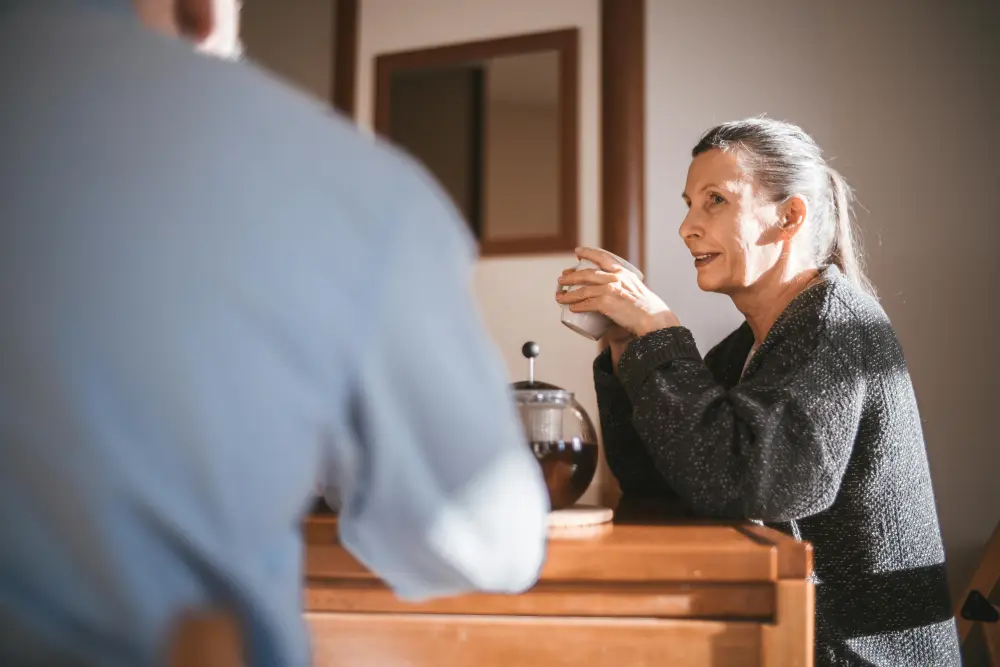When it comes to our loved ones, we want to ensure they are supported and cared for in the best possible way. But how do you know what is the right kind of support? Understanding the difference between care forms can be integral to helping our loved ones feel secure and comfortable moving forward.
In this article, we’ll explain everything you need to know, from identifying if your loved one needs care to whether or not home care is right for them.
For personalised advice, contact our team at myCare today.

Does Your Loved One Need Care?
Being able to identify if your loved one needs care, is an important skill to have. While they may seem perfectly fine, as we age changes can occur suddenly. If you’re not aware of these potential changes or issues, it may leave your loved one to struggle without support.
Below, we’ll detail several key warning signs your loved one may need care that you should look out for.
Forgetfulness and Behaviour
Increased forgetfulness is a common sign your loved one may need care. It could present as consistent lateness to appointments, missing medication or believing that they still have other commitments such as work.
Likewise, behavioural changes can occur and often be exacerbated by forgetfulness. Your loved one may become more paranoid or aggressive, believing what they think they remember over you. Combined, this can result in more confusion and increased distress or depression.
Furthermore, these are both key signs and symptoms of Alzheimer’s disease. If your loved one is suddenly experiencing these, or they have grown worse, it is recommended that you seek medical support and care.
Struggling With Maintenance
Our loved one’s ability to maintain their home, personal hygiene and nutrition can also slowly begin to decline over time. Their home may appear messier, with dirty dishes or parcels piling up. Likewise, they may struggle to keep their fridge restocked. Leaving empty shelves or expired food around the house.
This inability to manage the home can then bleed into personal care. They may forget, or struggle to, shower or clean their clothes. Furthermore, they may often struggle to stay hydrated and eat proper meals.
You may notice unbrushed hair, dirty or rumpled clothes or even odours. If your loved one is struggling with these, it may be time to seek care.
Motivation and Isolation
Our loved ones may also experience a lack of motivation or isolationist tendencies. They may struggle to face or manage problems that arise or pursue personal projects and goals. This can also present as increased fatigue and a lack of emotive expression.
Similarly, if they struggle to leave the home, or manage different situations they may become more withdrawn. This can cause them to become isolated and struggle to connect with others.
If left alone, all of these may present as depression or other concerning mental health issues. If you’ve noticed any of these signs, it may be worth considering care.

Home Care vs Care Homes
Once you’ve identified if your loved one needs care, it’s time to consider which type would be best for them. Every person’s circumstances and needs are unique to them. This is why it is important to consider the different forms of support that may be able to benefit your loved one.
Home Care
Home care can come in a range of different forms, but broadly it incorporates care that is provided in your loved one’s home. This can be tailored to meet their needs, from visiting care with a set schedule or live-in care to ensure they are consistently supported.
Home care is beneficial as it allows your loved one to receive care in a familiar environment. This is important, especially for those living with dementia or Alzheimer’s disease, as familiarity has been known to help combat confusion and distress.
They can also receive one-on-one care, personalised to meet their needs. In turn, this can help them feel more confident and support them in maintaining their dignity and independence. It can increase their sense of control and allow them to make more choices about their care.
Care Homes
Care homes are facilities designed for your loved one to live in where they can have continuous access to care workers to help them throughout the day and with health concerns. This can give them around-the-clock support, in a secure environment.
Likewise, many other people with similar issues and concerns will likely live in the care home as well. This can help your loved one feel a sense of community and cultivate new and meaningful friendships.
However, moving to a care home can often be overwhelming and confusing. Likewise, it can place them in an unfamiliar environment. This can sometimes make it more difficult for them to orient themselves or remember where they are at different times.
Furthermore, the care workers’ attention is split between other patients. This can result in less focused care, limiting your loved one’s ability to live the way they would prefer. Similarly, if funding is a concern, care homes are often more expensive than home care.

Is Home Care the Right Choice?
Before choosing between care options, it’s important to involve your loved one in the decision. Making care choices without their input can often leave them feeling more confused or distressed. By including them in the process they can feel safer and more secure going forward.
A study in the US National Library of Medicine indicates that ‘patient and family participation in turn can give critical support … for patient, family and carer empowerment.’
As such, it is clear how important this decision is for your loved one and your family. Sit down and discuss your options with your loved one to hear what they would prefer before making a decision.
Likewise, consider the level of care your loved one may require. If they need more comprehensive care, a care home may be the best choice. However, live-in home care can also support their complex needs.
Similarly, if maintaining their independence is important for your loved one, home care is likely the better option. Every family is unique and every person has different needs and preferences. The right choice puts your family and loved ones first.
The Home Care You Need
If home care is the right choice for your loved one, reach out to our myCare team today. We can help you navigate the different forms of home care so that you can tailor support to meet your loved one’s needs.
Benefit from one-on-one care in a familiar and comfortable environment. With our extensive experience in the home care industry, we know the best ways to offer your loved one support and improve their quality of life.





